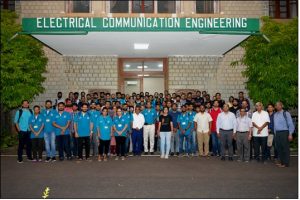
The EECS Research Students Symposium series started in 2010 in response to a request from students for a forum to discuss their work and obtain feedback from their peers, faculty, and industry. Hence, the primary purpose of the symposium has been to showcase the work of senior students from the departments of Computational and Data Sciences (CDS), Computer Science and Automation (CSA), Electrical Communication Engineering (ECE), Electrical Engineering (EE), Electronic Systems Engineering (ESE), and the Robert Bosch Centre for Cyber-Physical Systems (RBCCPS).
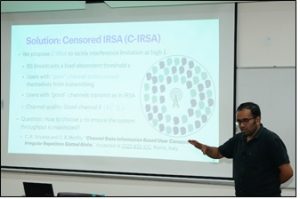
The fourteenth edition of this symposium (EECS 2023) was organised from 3–4 April 2023 by the Division of Electrical, Electronics, and Computer Sciences (EECS). The two-day event encompassed student presentations under 11 research clusters: Artificial Intelligence and Machine Learning (2 sessions); Brain, Computation, and Data Sciences; Cyber-Physical Systems; Microelectronics, RF, and Photonics; Computer Systems, Networking, and IoT; Power Engineering; Security and Privacy; Signal Processing and Communications; Theoretical Computer Science; and Visual Analytics.
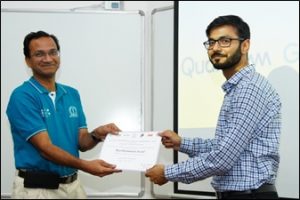
A sample of the student presentations are as follows: ‘Scalable deep learning models for inverse scattering’, ‘Antennas and receivers for a ground-based detection of CMB spectral distortions’, ‘Achieving envy-freeness with limited subsidies under dichotomous valuations’, ‘Towards an indigenous smart intraoperative probe for brain tumour delineation’, and ‘A multi-armed bandit approach for demand aware multi-robot task scheduling’. The best presentations were selected from the 11 cluster sessions and the Best Student Presentation awards were given to these students during the closing ceremony.
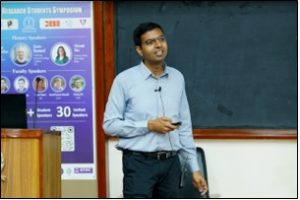
The symposium also featured lectures by practioners and experts. While the faculty talks were by faculty who have recently joined the Indian Institute of Science (IISc), the invited talks were by leading researchers and industry experts.
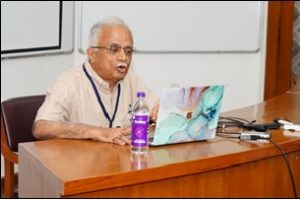
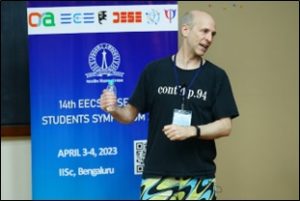
The plenary talks on Day 1 and Day 2 were delivered by an academician and an industry expert, respectively. Kevin Buzzard, Professor of Pure Mathematics at the Imperial College, London, spoke on ‘Mathematics and the computer‘. He discussed the possibility of large language models and interactive theorem provers writing mathematical proofs by themselves, and the possibility of them replacing mathematicians. In summary, Buzzard said that he was not scared of being replaced by a machine right now.
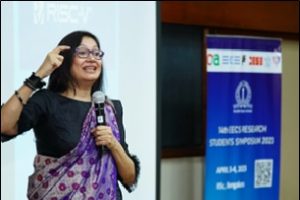
Nivruti Rai is Vice President, Intel Foundry Services, at Intel Corporation and Country Head of Intel India. She heads the Automotive Solutions Group for Intel Foundry Services. In her talk, Nivruti Rai spoke on the emergence of the new open, collaborative semiconductor design and manufacturing ecosystem that is advancing the momentum towards building a successful systems foundry. She highlighted that automotive, compute, and mobile will be the key drivers of the foundry market.
Another interesting part of the symposium was the Qualcomm live session with students and the TCS research café, wherein representatives from Qualcomm and TCS Research interacted with the students. EECS 2023 was sponsored by Qualcomm; Google; TCS Research; AI & Robotics Technology Park (ARTPARK), IISc; British Telecom India Research Centre (BTIRC), IISc; Centre for Brain Research (CBR), IISc; and Centre for Networked Intelligence (CNI), IISc.
